英语名词性从句
- 格式:doc
- 大小:157.50 KB
- 文档页数:13

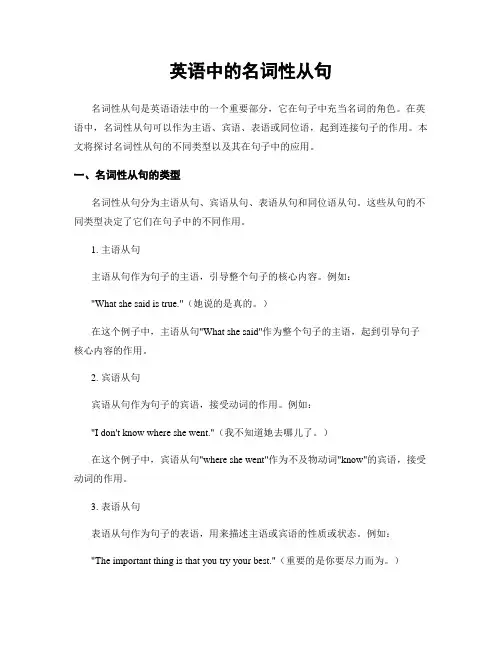
英语中的名词性从句名词性从句是英语语法中的一个重要部分,它在句子中充当名词的角色。
在英语中,名词性从句可以作为主语、宾语、表语或同位语,起到连接句子的作用。
本文将探讨名词性从句的不同类型以及其在句子中的应用。
一、名词性从句的类型名词性从句分为主语从句、宾语从句、表语从句和同位语从句。
这些从句的不同类型决定了它们在句子中的不同作用。
1. 主语从句主语从句作为句子的主语,引导整个句子的核心内容。
例如:"What she said is true."(她说的是真的。
)在这个例子中,主语从句"What she said"作为整个句子的主语,起到引导句子核心内容的作用。
2. 宾语从句宾语从句作为句子的宾语,接受动词的作用。
例如:"I don't know where she went."(我不知道她去哪儿了。
)在这个例子中,宾语从句"where she went"作为不及物动词"know"的宾语,接受动词的作用。
3. 表语从句表语从句作为句子的表语,用来描述主语或宾语的性质或状态。
例如:"The important thing is that you try your best."(重要的是你要尽力而为。
)在这个例子中,表语从句"that you try your best"用来描述主语"the important thing"的性质。
4. 同位语从句同位语从句用来解释或说明名词的含义。
例如:"His belief that hard work pays off is inspiring."(他坚信努力工作会有回报,这令人鼓舞。
)在这个例子中,同位语从句"that hard work pays off"用来解释名词"belief"的含义。
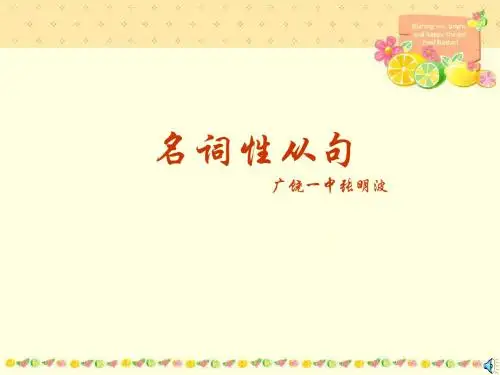
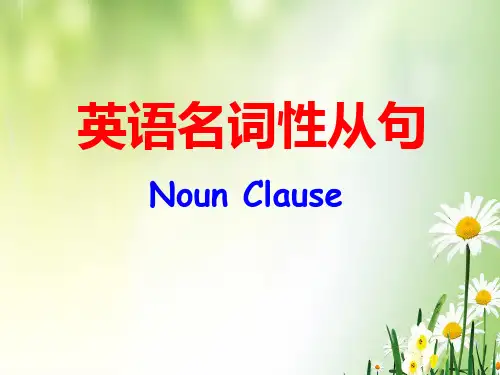
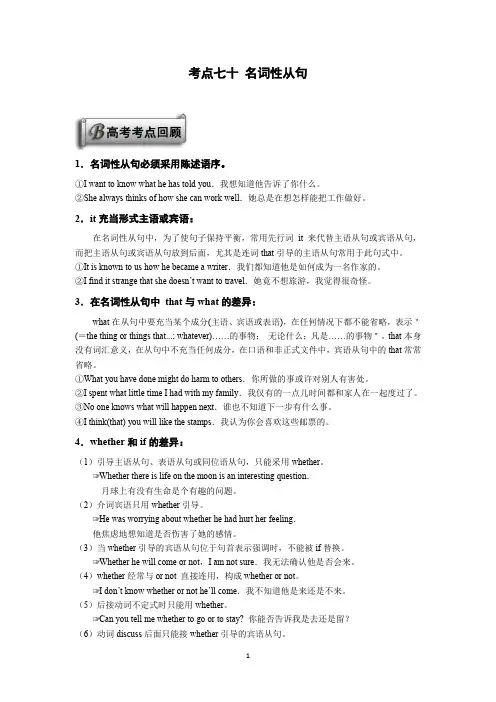
考点七十名词性从句1.名词性从句必须采用陈述语序。
①I want to know what he has told you.我想知道他告诉了你什么。
②She always thinks of how she can work well.她总是在想怎样能把工作做好。
2.it充当形式主语或宾语:在名词性从句中,为了使句子保持平衡,常用先行词it来代替主语从句或宾语从句,而把主语从句或宾语从句放到后面,尤其是连词that引导的主语从句常用于此句式中。
①It is known to us how he became a writer.我们都知道他是如何成为一名作家的。
②I find it strange that she doesn’t want to travel.她竟不想旅游,我觉得很奇怪。
3.在名词性从句中that与what的差异:what在从句中要充当某个成分(主语、宾语或表语),在任何情况下都不能省略,表示"(=the thing or things that...; whatever)……的事物;无论什么;凡是……的事物"。
that本身没有词汇意义,在从句中不充当任何成分,在口语和非正式文件中,宾语从句中的that常常省略。
①What you have done might do harm to others.你所做的事或许对别人有害处。
②I spent what little time I had with my family.我仅有的一点儿时间都和家人在一起度过了。
③No one knows what will happen next.谁也不知道下一步有什么事。
④I think(that) you will like the stamps.我认为你会喜欢这些邮票的。
4.whether和if的差异:(1)引导主语从句、表语从句或同位语从句,只能采用whether。
☞Whether there is life on the moon is an interesting question.月球上有没有生命是个有趣的问题。
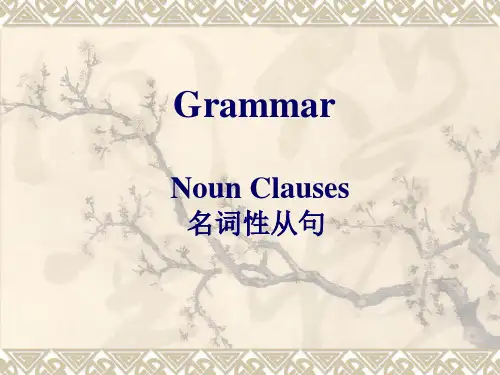
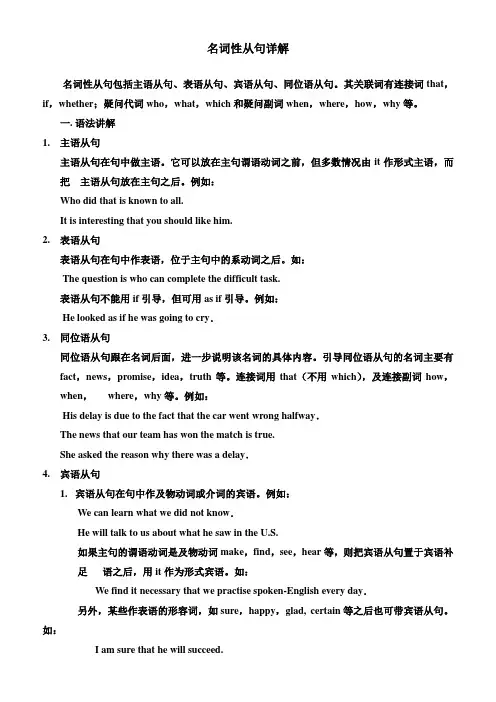
名词性从句详解名词性从句包括主语从句、表语从句、宾语从句、同位语从句。
其关联词有连接词that,if,whether;疑问代词who,what,which和疑问副词when,where,how,why等。
一.语法讲解1.主语从句主语从句在句中做主语。
它可以放在主句谓语动词之前,但多数情况由it作形式主语,而把主语从句放在主句之后。
例如:Who did that is known to all.It is interesting that you should like him.2.表语从句表语从句在句中作表语,位于主句中的系动词之后。
如:The question is who can complete the difficult task.表语从句不能用if引导,但可用as if引导。
例如:He looked as if he was going to cry.3.同位语从句同位语从句跟在名词后面,进一步说明该名词的具体内容。
引导同位语从句的名词主要有fact,news,promise,idea,truth等。
连接词用that(不用which),及连接副词how,when,where,why等。
例如:His delay is due to the fact that the car went wrong halfway.The news that our team has won the match is true.She asked the reason why there was a delay.4.宾语从句1.宾语从句在句中作及物动词或介词的宾语。
例如:We can learn what we did not know.He will talk to us about what he saw in the U.S.如果主句的谓语动词是及物动词make,find,see,hear等,则把宾语从句置于宾语补足语之后,用it作为形式宾语。
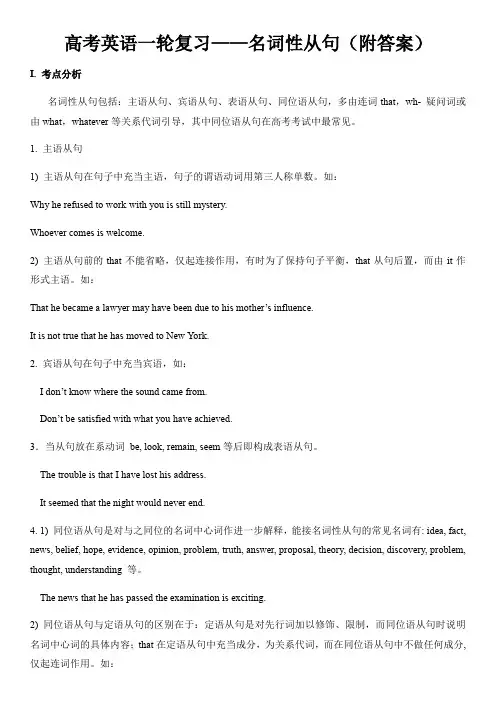
高考英语一轮复习——名词性从句(附答案)I. 考点分析名词性从句包括:主语从句、宾语从句、表语从句、同位语从句,多由连词that,wh- 疑问词或由what,whatever等关系代词引导,其中同位语从句在高考考试中最常见。
1. 主语从句1) 主语从句在句子中充当主语,句子的谓语动词用第三人称单数。
如:Why he refused to work with you is still mystery.Whoever comes is welcome.2) 主语从句前的that不能省略,仅起连接作用,有时为了保持句子平衡,that从句后置,而由it作形式主语。
如:That he became a lawyer may have been due to his mother’s influence.It is not true that he has moved to New York.2. 宾语从句在句子中充当宾语,如:I don’t know where the sound came from.Don’t be satisfied with what you have achieved.3.当从句放在系动词be, look, remain, seem等后即构成表语从句。
The trouble is that I have lost his address.It seemed that the night would never end.4. 1) 同位语从句是对与之同位的名词中心词作进一步解释,能接名词性从句的常见名词有: idea, fact, news, belief, hope, evidence, opinion, problem, truth, answer, proposal, theory, decision, discovery, problem, thought, understanding 等。

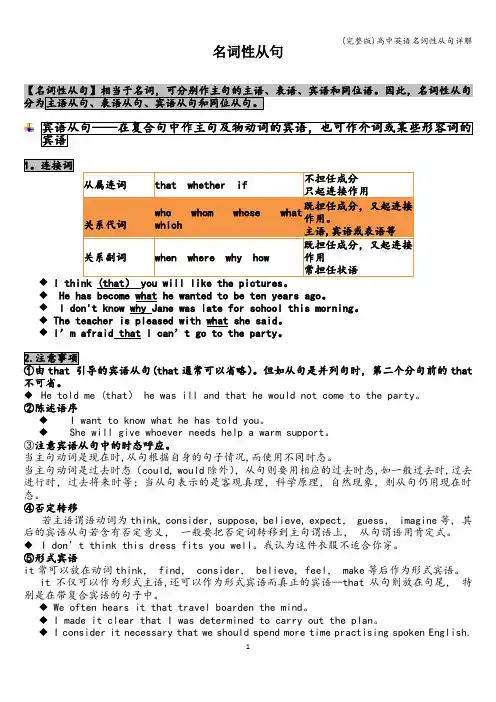
(完整版)高中英语名词性从句详解名词性从句【名词性从句】相当于名词,可分别作主句的主语、表语、宾语和同位语。
因此,名词性从句分为主语从句、表语从句、宾语从句和同位从句。
宾语从句——在复合句中作主句及物动词的宾语,也可作介词或某些形容词的宾语1。
连接词从属连词that whether if 不担任成分只起连接作用关系代词who whom whose whatwhich既担任成分,又起连接作用。
主语,宾语或表语等关系副词when where why how 既担任成分,又起连接作用常担任状语◆I think (that) you will like the pictures。
◆ He has become what he wanted to be ten years ago。
◆ I don't know why Jane was late for school this morning。
◆The teacher is pleased with what she said。
◆I’m afraid that I can’t go to the party。
2.注意事项(that通常可以省略)。
但如从句是并列句时,第二个分句前的that 不可省。
◆He told me (that) he was ill and that he would not come to the party。
②陈述语序◆ I want to know what he has told you。
◆ She will give whoever needs help a warm support。
③注意宾语从句中的时态呼应。
当主句动词是现在时,从句根据自身的句子情况,而使用不同时态。
当主句动词是过去时态(could, would除外),从句则要用相应的过去时态,如一般过去时,过去进行时,过去将来时等;当从句表示的是客观真理,科学原理,自然现象,则从句仍用现在时态。
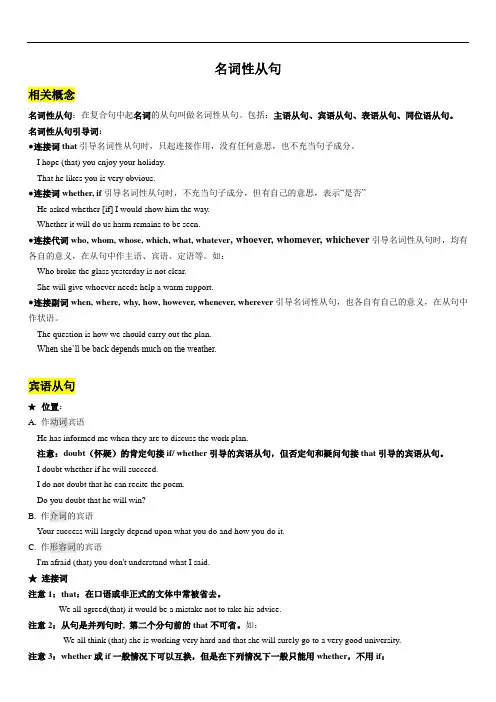
名词性从句相关概念名词性从句:在复合句中起名词的从句叫做名词性从句。
包括:主语从句、宾语从句、表语从句、同位语从句。
名词性从句引导词:●连接词 that引导名词性从句时,只起连接作用,没有任何意思,也不充当句子成分。
I hope (that) you enjoy your holiday.That he likes you is very obvious.●连接词 whether, if引导名词性从句时,不充当句子成分,但有自己的意思,表示“是否”He asked whether [if] I would show him the way.Whether it will do us harm remains to be seen.●连接代词 who, whom, whose, which, what, whatever, whoever, whomever, whichever引导名词性从句时,均有各自的意义,在从句中作主语、宾语、定语等。
如:Who broke the glass yesterday is not clear.She will give whoever needs help a warm support.●连接副词 when, where, why, how, however, whenever, wherever引导名词性从句,也各自有自己的意义,在从句中作状语。
The question is how we should carry out the plan.When she’ll be back depends much on the weather.宾语从句★位置:A. 作动词宾语He has informed me when they are to discuss the work plan.注意:doubt(怀疑)的肯定句接if/ whether引导的宾语从句,但否定句和疑问句接that引导的宾语从句。
名词性从句第一部分:语法讲解名词从句是指在句子中起名词作用的各种从句。
根据它们在句子中所起的作用不同,名词从句可以分为主语从句、表语从句、宾语从句和同位语从句。
如:That the earth is round is a fact.I don’t know if he needs my help.I don’t know where he went.2.主语从句1)主语从句在句中作主语。
如:Whether he will accept the invitation is not clear.他是否会接受邀请还不清楚。
When he left is unknown.他什么时候离开还不知道。
That he will come to the discussion is certain.他来参加讨论是肯定无疑的。
2)主语从句放在句首,句子常常显得比较笨重,因此常把它移至句子末尾,而用it作形式上的主语。
如:It is strange that she did not come yesterday. 很奇怪,她昨天没有来。
It has not been announced when the plane is to take off.飞机何时起飞还没有宣布。
It is a pity that Mr.Brown can’t attend our English meeting.真可惜,布朗先生不能出席我们的英语晚会。
3)有些用“it”作形式主语的主语从句结构已形成固定的用法。
a)It is +名词+从句如:It is a fact that…事实是……It is common knowledge that………是常识b)It is +形容词+that从句如:It is necessary that…有必要……It is likely that…有可能……It is important that…重要的是……c)It is +过去分词+从句如:It is said that…据说……It is reported that …据报道……It is well known that…众所周知……It is estimated that…据估计……d)It +不及物动词+从句如:It seems that …好像……It happened that…碰巧……如:It is estimated that millions of galaxies exist in the vast space outside the Milk Way.据估计,在银河系之外的辽阔星空中存在着千百万个星系。
高中英语语法——名词性从句在句子中起名词作用的句子叫名词性从句(Noun Clauses)。
名词性从句的功能相当于名词词组,它在复合句中能担任主语、宾语、表语、同位语、介词宾语等。
因此根据它在句中不同的语法功能,名词从句又可分别称为主语从句、宾语从句、表语从句和同位语从句。
1主语从句主语从句是在复合句中充当主语的从句,通常放在主句谓语动词之前或由形式主语it代替,而本身放在句子末尾。
1 it作形式主语和it引导强调句的比较it作形式主语代替主语从句,主要是为了平衡句子结构,主语从句的连接词没有变化。
而it引导的强调句则是对句子某一部分进行强调,无论强调的是什么成分,都可用连词that。
被强调部分指人时也可用who/whom。
例如:1. It is a pity tha t you didn’t go to see the film. 你不去看那场电影真可惜。
2. It doesn’t interest me whether you succeed or not. 我对你成功与否不感兴趣。
3. It is in the morning that the murder took place. 谋杀案是在早上发生的。
(强调句型)4. It is John that broke the window. 是John打碎的窗户。
(强调句型)2 用it作形式主语的结构1. It is+名词+从句It is a fact that…事实是……It is an honor that…非常荣幸……It is common knowledge that………是常识2. It is+形容词+从句It is natural that…很自然……It is strange that…奇怪的是……3. It is+不及物动词+从句It seems/appears that…似乎……It happened (to sb.) that…碰巧……4. It+过去分词+从句It is reported that…据报道……It has been proved that…已证实……It is said that…据说……3 主语从句不可位于句首的五种情况:1. if 引导的主语从句不可居于复合句句首。
高考英语名词性从句讲解一、概念:名词性从句相当于名词词组,在复合句中起名词性作用。
分类:主语从句、表语从句、宾语从句和同位语从句。
引导名词性从句的1)连接词:that, whether, if;2)关系代词:who, whom, whose, what, which, whatever, whichever;3) 关系副词:when, where, how, why.二、要点:人物主语:who, whoever what, whatever宾语:whom, whomever what, whatever名词性从句表语:whom what定语:which what whose状语when where why how whenever however wherever不做成份:that if/whether as if /as though三、基础知识学习:1主语从句: 主语从句是在复合句中代替作主语的名词, 充当主语的从句,通常放在主句谓语动词之前或由形式主语it代替,而本身放在句子末尾。
1.that 引导的主语从句①句首That a round-trip to Mars would take more than a year and a half is estimated.That he misunderstood me is obvious.That引导主语从句,放句首,不做任何成分,不可省略。
②用形式主语it来引导句子A. that引导主语从句放句首时,有时会为了避免头重脚轻,保持句子平衡,常用it做形式主语,把真正的that引导的主语从句放句后。
It is strange that he made no answer.It is known to all that the earth is round.B. 用it做形式主语的主语从句结构注意:i. It作形式主语和it引导强调句的比较It作形式主语代替主语从句,主要是为了平衡句子结构,主语从句的连接词没有变化。
专题十三名词性从句基础知识一、名词性从句概念:名词性从句指的是在主句中起的作用相当于名词的从句,主要包括主语从句,宾语从句、表语从句和同位语从句。
名词性从句主要有4种从句结构:(1)that引导的从句(2)以whether/if引导的从句。
(3)以特殊疑问词引导的从句:a连接代词;what .who. whom. which. whose.等。
b连接副词:when. where. why和how等(4)以what.或wh-ever 等连接代词引导的名词性从句。
如:whatever、whoever、whichever、whomever、whenever、wherever和however等。
此外as if/as though可引导表语从句。
二、具体用法:主语从句:1、that引导的主语从句位于句首:eg: That he will come to visit us makes us excited=It makes us excited that he’ll come to visit us.That in some contries women are still treated unequally is unfair.=It is unfair that in some contries women are still treated unequally2、that从句作主语时,常用it作形式主语常见的句型有:(1)It is/was+adj; (necessary, important, strange, unbelievable, vita, etc)+that从句[should + v,原]eg: It is necessary that a college student (should) master one or two foreign languages.It is strange that you(should) trust Jane.(2)It is/ was+名词词组(no wonder/ an honer/ a good thing/ a pity/ no surprise. etc)+that+从句eg:It’s a pity that we can’t go.It’s no surprise that our team has won the game.(3)It is/ was+过去分词(said/ reported/ thought/ expected/ decided/announced/ arranged/ suggested/ advised/ ordered/ requested/ insisted/ required/ demanded等)+that+从句eg: It is announced that the plan has been successfully carried out.It is suggested that you(should) spend more time in studying English.注:表建议、命令、要求的过去分词后的that从句中的谓语V用should+V.原(4)It+特殊动词(happen/ occur/ seem/ appear/ chance等)+that从句。
适用文档名词性从句解说在复合句中起名作用的从句叫做名性从句。
它包含主从句、从句、表从句和同位从句。
名性从句是中学段的一个重要法目,在年的高考取几乎都波及到,而且每年的命各有化。
解析届高考名性从句考的焦点主要有以下六个方面1.考名性从句的序2.考引 that与 what 的区3.考 it 在名性从句中作形式主或形式的用法4.考 whether 与 if 的区5.考名性从句中的疑+ever 引的名性从句与no matter+ 疑引的状从句的区6.考名性从句的虚气法重点解析一、名性从句主从句、表从句、从句、同位从句,在整个句子中所起的作用,相当于一个名。
所以,四种从句通称名性从句。
引名性从句的接可分三:接: that, whether, if(不充任从句的任何成分)接代: what, whatever, who, whoever, whom, whose, which.接副: when, where, how, why1.主从句作句子主的从句叫主从句。
主从句往常由附属that ,whether ,if和接代what ,who,which ,whatever , whoever 以及接副 how, when, where, why 等引。
that 在句中无,只起接作用;接代和接副在句中既保存自己的疑含、又起接作用,在从句中充任从句的成分。
比如:What he wants to tell us is not clear.他要跟我什么,不清楚。
It is known to us how he became a writer.我都知道他是如何成一名作家的。
Where the English evening will be held has not yet been announced.英晚会将在哪里行,没有宣告。
有防止句子重脚,常用形式主it取代主从句作形式主放于句首,而把主从句置于句末。
主从句后的一般用数形式。
名词性从句在句子中起名词作用的句子叫名词性从句。
名词从句的功能相当于名词词组, 它在复合句中能担任主语、宾语、表语、同位语等,因此根据它在句中不同的语法功能,名词从句又可分别称为主语从句、宾语从句、表语从句和同位语从句。
概说引导名词性从句的连接词引导名词性从句的连接词可分为三类:连接词:that, whether ,if (不充当从句的任何成分)连接代词:what, whatever, who, whoever, whom, whose, which连接副词:when, where, how, why 以及由how 构成的词组如how many ,how much, how soon, how often ,how far ,how long, how tall ,how high等.1,名词性that-从句1)由从属连词that引导的从句叫做名词性that-从句。
That只起连接主句和从句的作用,在从句中不担任任何成分,本身也没有词义。
名词性that-从句在句中能充当主语、宾语、表语、同位语。
例如:主语:That he is still alive is sheer(全然的) luck.他还活着全靠运气。
动词宾语:John said that he was leaving for London on Wednesday. 约翰说他星期三要到伦敦去。
形容词宾语:I am glad that you are satisfied with your job. 你对工作满意我感到很高兴。
介词宾语: I know nothing about him except that he is from the United States.除了知道他是从美国来之外,我对他全无了解表语:The fact is that he has not been seen recently. 事实是近来谁也没有见过他。
同位语:The fact that he has not been seen recently upsets everyone in his office. 近来谁也没有见过他,这一情况令办公室所有的人不安。
2 if, whether引导的名词性从句1)yes-no型疑问从句,从属连词if, whether引导的名词从句是由一般疑问句或选择疑问转化而来的,因此也分别被称为yes-no型疑问句从句和选择型疑问从句,其功能和that-从句的功能相同。
例如:主语:Whether the plan is doable remains to be proved. 这一计划是否可行还有等证实。
宾语:Let us know whether / if you can finish the article before Friday.请让我们知道你是否能在星期五以前把文章写完。
形容词宾语:She's doubtful whether we shall be able to come. 她怀疑我们是否能够前来。
介词宾语:I worry about whether he can pass through the crisis of his illness.我担心他是否能度过疾病的危险期。
表语:The point is whether we should lend him the money.问题在于我们是否应该借钱给他。
同位语:They are looking into the question whether the man is trustworthy.他们调查他是否值得信赖。
2)选择性疑问从句选择性疑问从句由关联词if/whether…or或whether…or not构成。
例如:Please tell me whether / if they are Swedish or Danish.请告诉我他们是瑞典人还是丹麦人。
I don't care whether you like the plan or not. 我不在乎你是否喜欢该计划。
3, 名词性wh-从句由wh-词引导的名词从句叫做名词性wh-从句。
Wh-词包括who, whom,. whose, whoever, what, whatever, which, whichever等连接代词和where, when, why how, how many ,how much, how soon, how often ,how far ,how long, how tall ,how high等连接副词。
Wh-从句的语法功能除了和that-从句一样外,还可充当宾语补语和间接宾语等。
例如:主语:How the book will be sold depends on its writer.书销售如何取决于作者本人。
直接宾语:In one's own home one can do what one likes.在自己家里可以随心所欲。
间接宾语:The club will give whoever wins a prize.获胜者俱乐部将颁奖。
形容词宾语:I'm not sure why she refused their invitation.我尚不能肯定她为什么拒绝他们的邀请。
介词宾语:That depends on where we shall go. 那取决于我们去哪儿。
表语:My question is who will take over president of the club.我的问题是谁将接任该俱乐部主席职位。
宾语补足语:She will name him whatever she wants to.她高兴给他起什么名字就取什么名字。
同位语:I have no idea when he will return.我不知道他什么时候回来。
主语从句主语从句在句中做主语,例如:That mathematics finds its use in every science is obvious.数学在各个学科中都有用是很显然的That he was chosen made us very excited.他被选上了使得我们很激动Why the earth moves round the sun is quite clear now.地球绕太阳转的原因现在已经很清楚.Whether he was chosen is unknown.他有没有被选上还不知道.What we need is careful preparation.我们需要的是准备.Who will go makes no difference. 谁去都一样.Which team will win the match is still not certain.哪个对要赢还不是很有把握.When they will start has not been decided yet.他们什么时候出发还没有决定.Where she has gone is a mystery. 他到什么地方去了是个秘密How this happened is not clear. 究竟是怎么回事儿还不清楚.Wherever you are is my home ---- my only home.你所在的任何地方就是我的家----我唯一的家。
注意连接代词whoever, whatever, whichever等引导主语从句的含义Whoever comes will be welcome. (whoever=anyone who) 来的人将受到欢迎。
Whoever is tired may rest. (whoever=anyone who)任何累了的人都可以休息Whatever he did was right. (whatever=the thing that) 他所做的事情是正确的。
Whichever of you comes in will receive a prize. (whichever=anyone of you who)在口语中常用whoever代替whomever.Whoever/whomever you invite will be welcome.你们当中不论哪个进来将会得到奖励。
主语从句常放在句尾而用it 做形式主语使句子更加平衡,这时口语中常省略that, 如上面第一句改成“It is obvious (that) mathematics finds its use in every science.”更好。
在下列情况下必须把主语从句放在句尾而用it 作形式主语:1.It+be+过去分词(said, reported, thought, expected, believed, decided, known, announced, arranged, suggested, ordered etc.)+that从句。
如:It is said that Mr. Green has arrived in Beijing. 据说格林先生已经到了北京。
It is reported that China has sent another man-made earth satellite into orbit.据报道中国又成功地发射了一颗人造地球卫星。
It is said that he is a good doctor.据说他是个医生It is suggested that the meeting ( should ) be put off. 建议把会议推迟。
It was ordered that we ( should ) arrive there in two hours。
得到命令我们两小时内赶到那里》2.主句是疑问句或感叹句时,如:Is it true that the film star will come?How wonderful it is that we'll visit the Great Wall tomorrow.Does it matter much that they will not come tomorrow? 他们明天不来很要紧吗?How strange it is that the children are so quiet! 孩子们这么安静真奇怪!3.主句谓语动词是appear,seem, turn out, happen, occur, come, strike, follow, matter 等时,如:It (so)happened that she had a cold and didn't go with us that day.It turned out that I was wrong.It seems that this test is reliable(可靠的).4.It+be+形容词(obvious, true, natural, surprising, good, wonderful, funny, possible, (un)likely , (im)possible, certain, probable, etc.)+that从句。